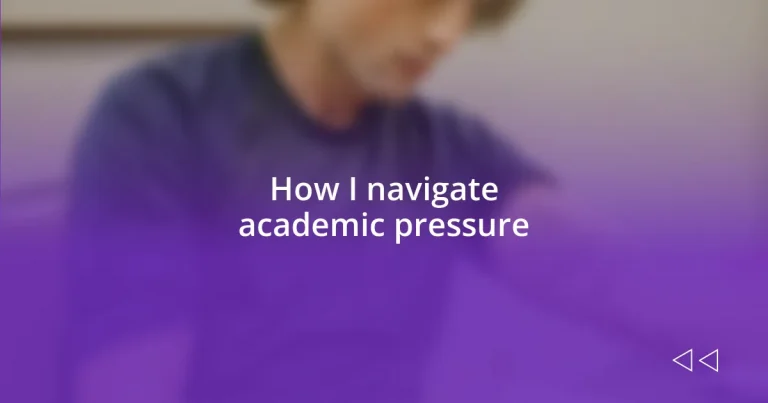Key takeaways:
- Understanding academic pressure involves recognizing personal expectations, perfectionism, and external demands.
- Identifying stress sources, like workload and peer pressure, is crucial for effective management.
- Building a supportive network and utilizing time management strategies significantly alleviate academic stress.
- Setting realistic goals and reflecting on personal progress foster resilience and enhance the learning experience.
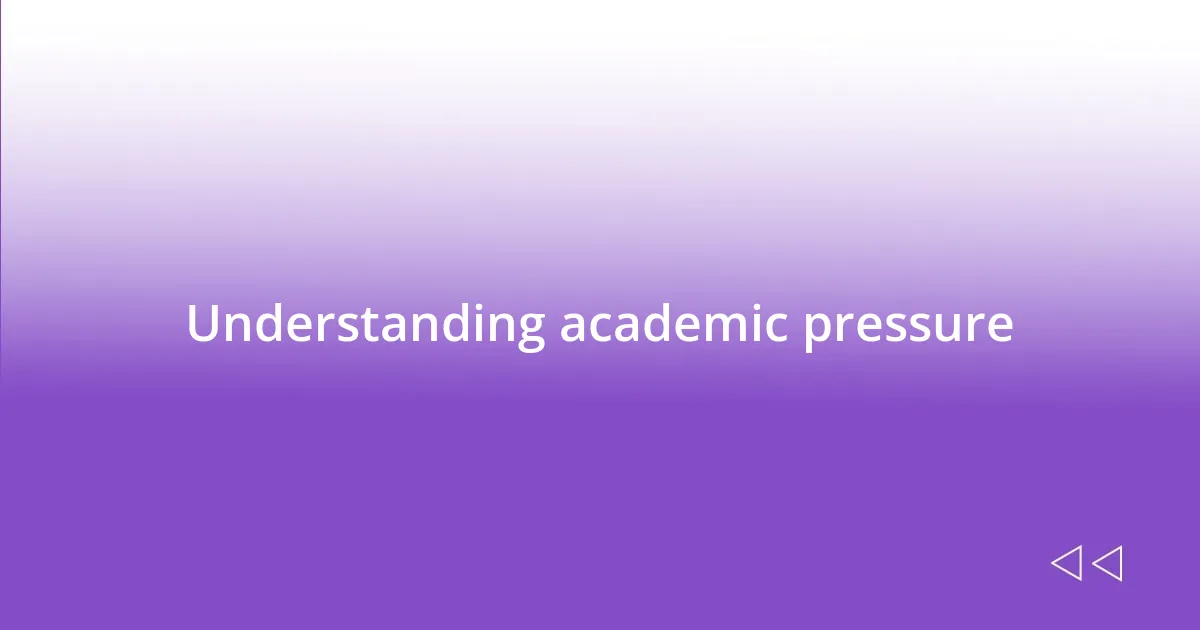
Understanding academic pressure
Academic pressure can often feel overwhelming, can’t it? I still remember moments in college where everything seemed to collide at once—assignments, exams, and looming deadlines. It was in those instances that I realized academic pressure isn’t just about the workload; it’s about the expectations we set for ourselves and those imposed by others.
I’ve encountered times when the fear of disappointing my professors, peers, or even my family pushed me to the limit. It’s a tightrope walk between striving for excellence and maintaining mental health. I found that understanding the root causes of this pressure, like perfectionism or a competitive environment, is vital to managing it effectively.
Looking back, I often ask myself why I let a grade dictate my self-worth. Embracing the reality that failure is a part of growth has been liberating. Academic pressure, while daunting, can also be a powerful teacher if we let it guide us rather than control us.
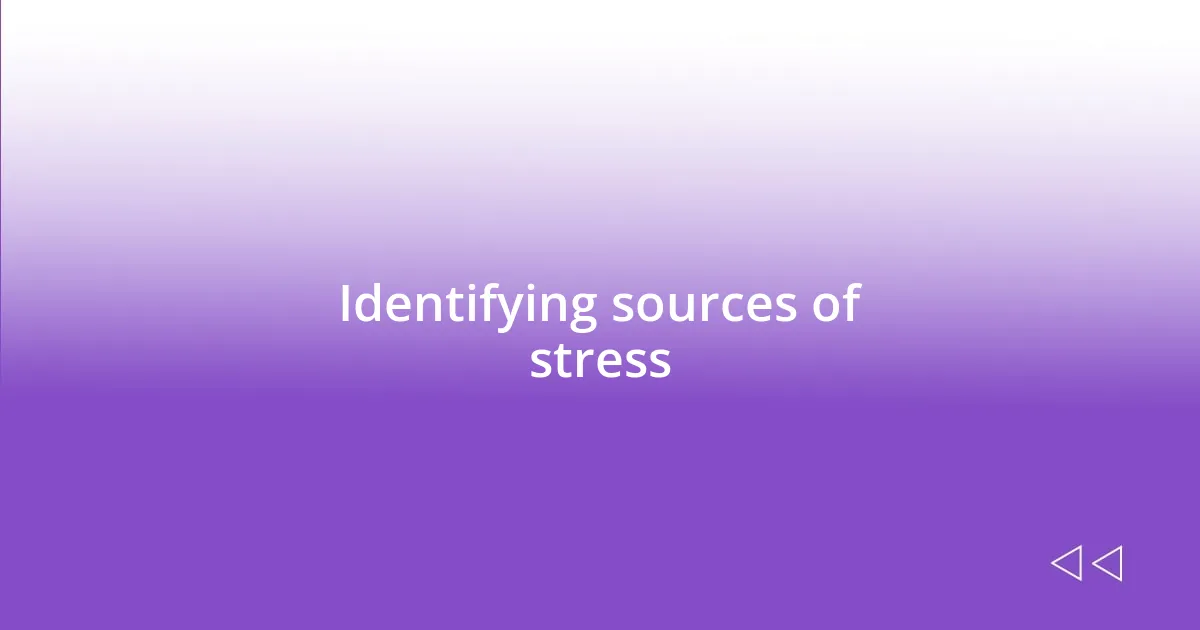
Identifying sources of stress
Identifying the sources of stress in academic life is crucial for managing it effectively. One major source I found was the overwhelming volume of assignments. I still recall days when I’d open my planner and see pages filled with deadlines, each one whispering urgency as if they were all due yesterday. This situation often left me feeling paralyzed, unsure of where to start.
Another critical source I’ve identified is the pressure from peers. In college, I experienced this firsthand during group projects where team dynamics played a huge role. I would often catch myself comparing my contribution to others’, thinking, “Am I doing enough?” It’s exhausting when you feel like you’re in a constant race with your classmates instead of working together toward a common goal.
Lastly, personal expectations can sometimes be the biggest stressors of all. For instance, my inner critic would frequently remind me that I needed to achieve top grades, often overshadowing my achievements. This relentless pursuit of perfection created an environment of self-imposed stress that I had to learn to confront and manage.
| Source of Stress | Description |
|---|---|
| Volume of Assignments | Overwhelming workload leading to feelings of paralysis and urgency. |
| Peer Pressure | Constant comparison with classmates, creating a competitive environment. |
| Personal Expectations | Self-imposed pressure to achieve perfection, overshadowing accomplishments. |
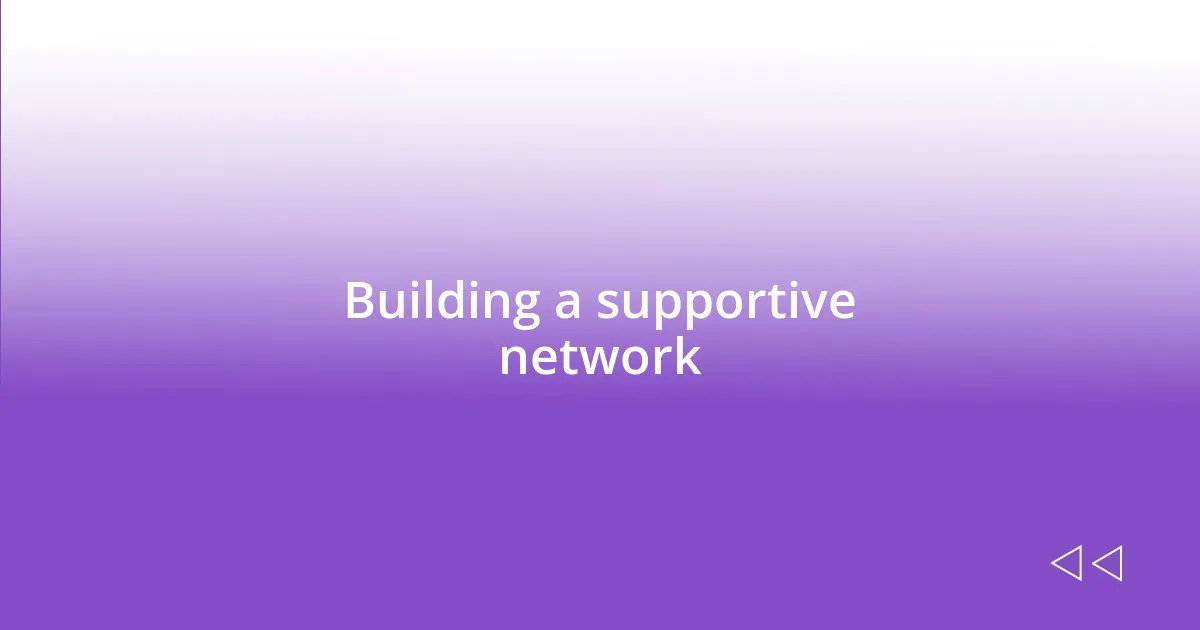
Building a supportive network
Building a strong, supportive network has been a game changer for me in navigating academic pressure. I remember during my final year when the weight of deadlines felt especially heavy. Reaching out to classmates for study groups not only lightened the load but also fostered a sense of camaraderie. It was comforting to share my worries with others who were in the same boat, which made those intense weeks feel a little less daunting.
Creating a solid support system involves intentionality. Here are a few steps I found helpful:
- Connect with classmates: Regularly engage with peers to share insights and collaborate on projects.
- Seek out mentors: Establish relationships with professors who can provide guidance and encouragement.
- Join student organizations: Getting involved can help to form friendships and provide additional resources.
- Utilize campus resources: Tap into counseling services or academic support centers when needed.
- Communicate openly: Share your feelings and struggles with friends and family, which can help to alleviate stress.
With these actions, I realized that I wasn’t alone in my academic journey, which made all the difference.
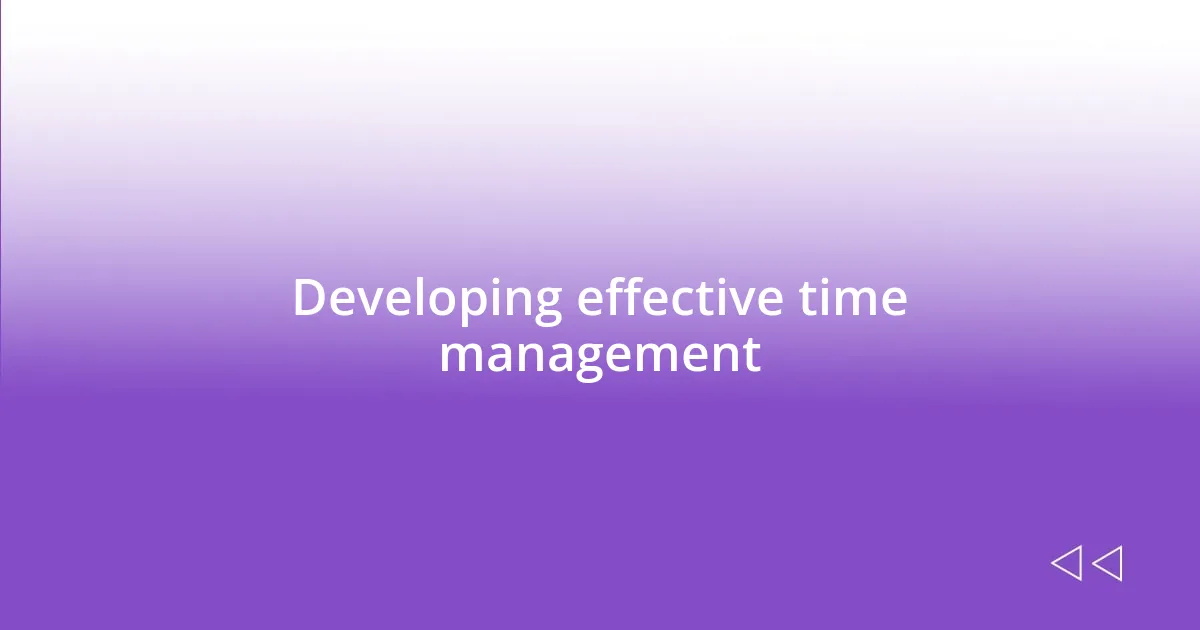
Developing effective time management
Managing time effectively has been a revelation in my academic life. I remember the first semester when my approach to assignments felt chaotic, like trying to juggle flaming torches. It dawned on me that I needed a strategy. I started to break tasks into smaller parts and set specific time blocks for each one. This simple change transformed my overwhelming to-do list into manageable chunks that I could tackle with confidence, turning anxiety into productivity.
Creating a detailed planner has also been a game-changer for me. I vividly recall the relief I felt when I began marking deadlines, classes, and study sessions in my calendar; suddenly, everything felt less daunting. Now, I ask myself, “What’s the next most important task?” This little question keeps my focus sharp. I prioritize based on urgency and importance, and visually seeing my responsibilities laid out helps me breathe a bit easier, almost like a mental defogger.
One essential technique I’ve found valuable is the Pomodoro Technique, where you work for 25 minutes straight, then take a 5-minute break. I was skeptical at first, thinking, “Can I really focus for just 25 minutes?” But I gave it a shot, and the boost in productivity was incredible! Those brief breaks recharge my mind, making it easier to dive back into my work refreshed. I often wonder how many students overlook such simple strategies that could significantly alleviate their stress. Wouldn’t you feel more in control if you had a plan? Embracing structured time management has made a significant difference in how I navigate the pressures of academia.
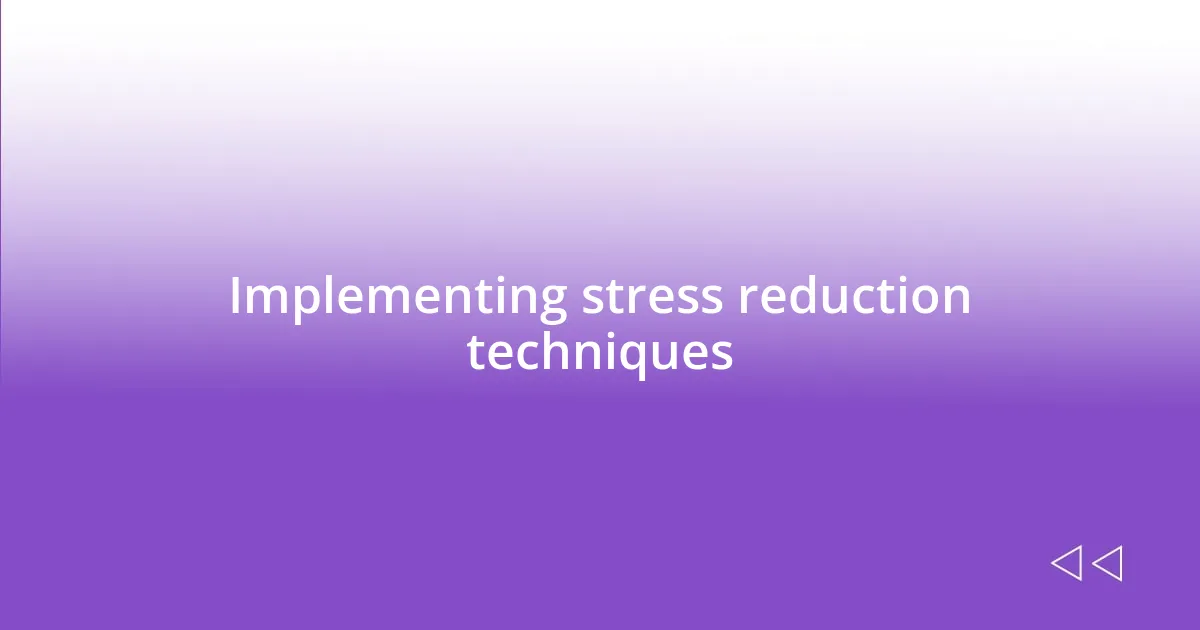
Implementing stress reduction techniques
Implementing stress reduction techniques is an essential component of navigating academic pressure, and I’ve discovered several strategies that work wonders for me. One of my go-tos is mindfulness meditation. I remember the first time I sat in silence for just five minutes, focusing on my breath. It felt odd at first, but gradually, I noticed a calmness wash over me. Now, whenever I feel that familiar whirl of anxiety creeping in, I take a moment to reconnect with my breath. It’s shocking how just a few mindful breaths can shift my perspective and ground me, making challenges seem a bit more manageable.
In addition to mindfulness, physical activity has become my stress antidote. There was a time when I’d hit the books for hours without a break, thinking it would help me absorb more information. But I quickly learned that this approach only drained my energy. Incorporating short walks or quick workouts into my schedule has revitalized my mind and boosted my mood. Whenever I step outside, feel the fresh air, or just dance around my room for a few minutes, I return to my studies with renewed focus and a smile. Isn’t it incredible how a little movement can transform our mindset?
Lastly, I’ve found that creative outlets are a powerful tool for stress reduction. Painting, writing, or even playing an instrument helps me express what I’m feeling in a different way. There was a particularly stressful week filled with exams when I picked up my guitar and strummed some chords. It was like releasing a pressure valve; every note pulled away some of the tension I had built up. Have you ever noticed how indulging in a hobby can dissolve worries? Channeling emotions into creativity not only provides relief but also enriches my academic journey with joy.
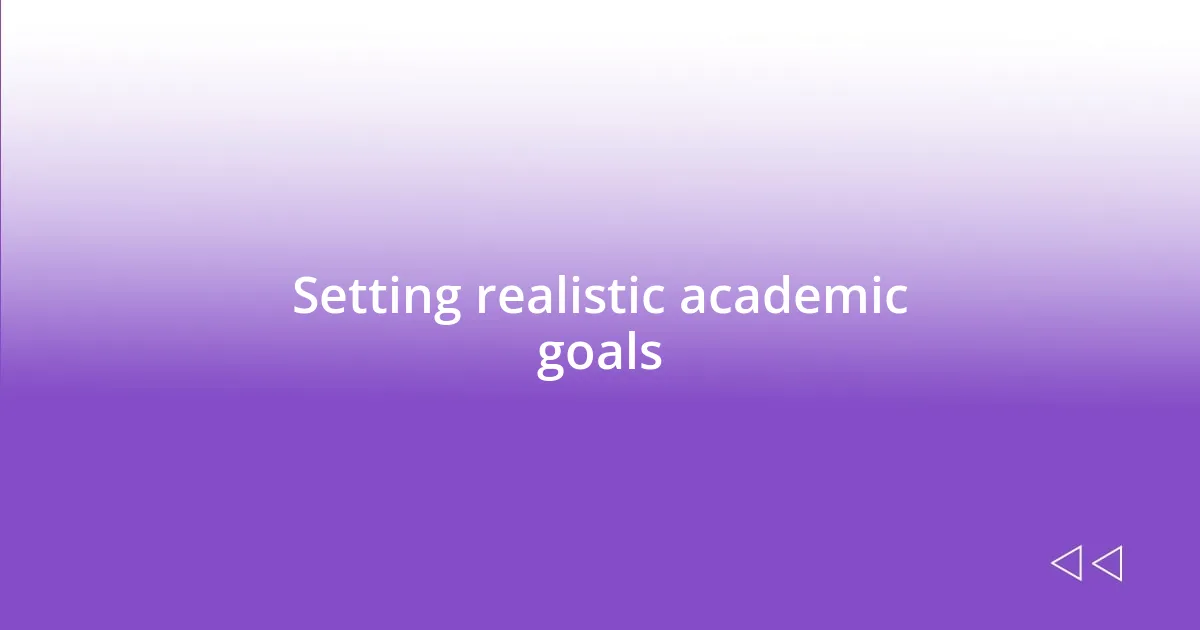
Setting realistic academic goals
Setting realistic academic goals has been a game-changer in my studies. I remember the time I aimed to achieve an impossible GPA while juggling multiple commitments. It felt like an uphill battle that left me drained and frustrated. I realized then that setting smaller, achievable goals—like focusing on one subject at a time—made a significant difference. This shift allowed me to celebrate small victories and build momentum, instead of feeling defeated before I even started.
Each semester, I take a close look at what I hope to achieve and assess my current commitments. For instance, during a particularly hectic time, I decided to focus on improving my research methods instead of stretching myself thin with every course. It was liberating! I noticed that by honing in on this goal, I not only grasped the material better but also found joy in the learning process. Have you ever thought about how narrowing your focus might help you thrive without feeling overwhelmed?
I’ve also learned to be flexible and adjust my goals as needed. Last year, I set a high target for my final project, aiming to publish my findings. However, as deadlines loomed closer, I realized that perfection wasn’t feasible. Instead, I shifted my goal to simply delivering a solid project I could be proud of. This pivot allowed me to maintain my sanity and still produce work I was satisfied with. Doesn’t it feel good when you can adapt your path while still aiming for success? By setting realistic goals and allowing myself some grace, I not only survived a demanding semester but emerged more resilient and confident in my abilities.
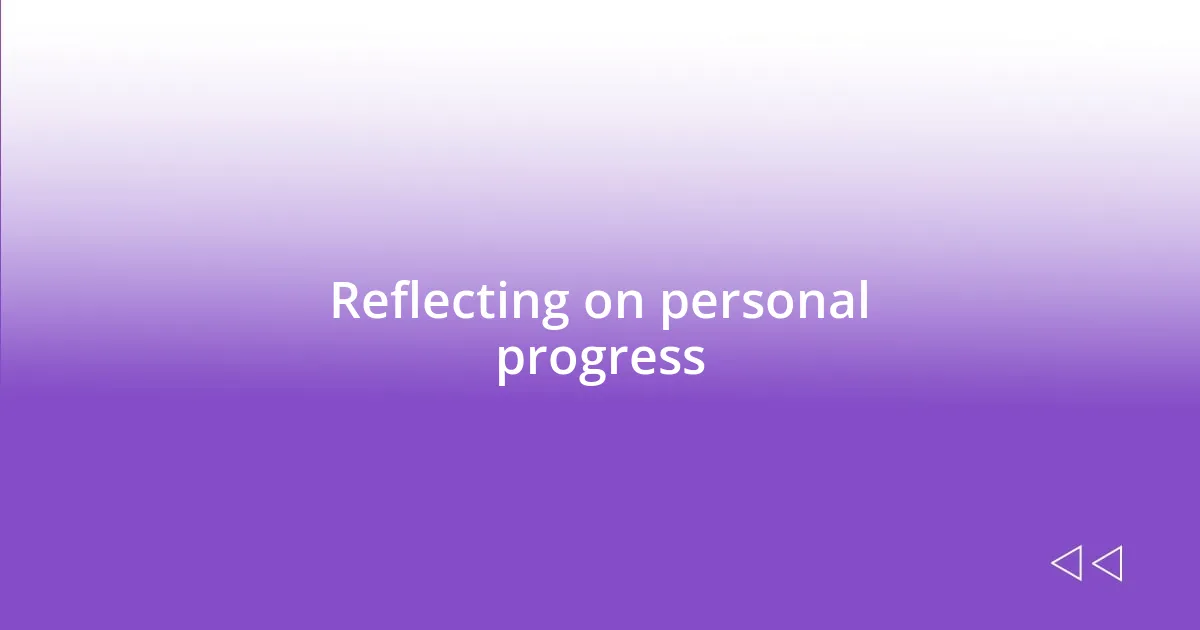
Reflecting on personal progress
Reflecting on personal progress has become an essential practice for me amidst the hustle of academic life. I remember when I first started journaling about my daily achievements and challenges. It felt a bit awkward at first—noticing the little things like finishing a reading assignment or engaging in class discussions. Yet, over time, I found that celebrating these moments reminded me of how far I’ve come. Have you ever thought about how acknowledging your small wins can change your outlook?
As I delve deeper into this reflective practice, I’ve begun to see patterns in my learning journey. For instance, I often struggled with procrastination, which led to rushing through assignments at the last minute. By reflecting on this habit, I realized it stemmed from fear of failure, something many of us experience. Through recognizing this, I began to tackle tasks earlier, allowing space for quality work and reducing anxiety. Isn’t it fascinating how self-reflection can illuminate not just what we do, but why we do it?
I also make it a point to revisit my goals periodically. Last semester, I found myself overwhelmed with coursework and extra-curricular activities, feeling like I was constantly treading water. By reflecting on my progress, I recognized that some goals needed to be set aside to truly focus on what mattered at that moment. This realization not only eased the pressure but also helped me align with my passions, cultivating a more satisfying and less stressful academic experience. Have you found that reevaluating your priorities can spark a fresh sense of clarity?












